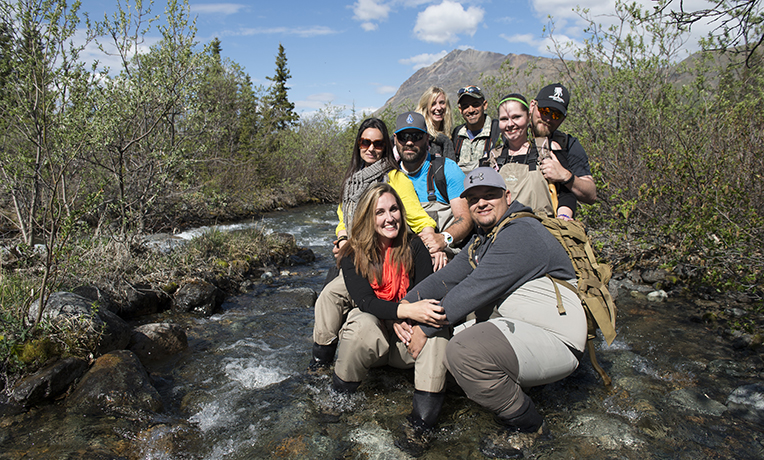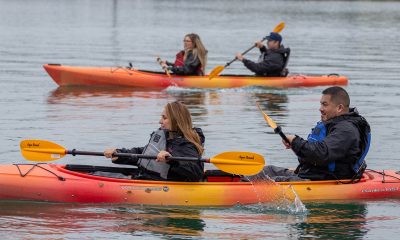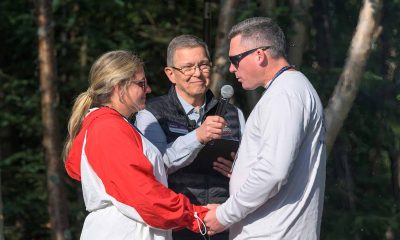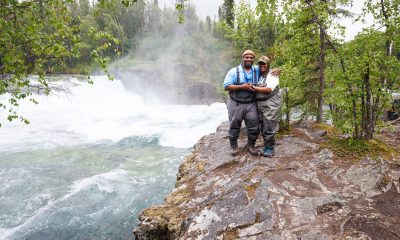While spending a week in Alaska through Operation Heal Our Patriots, a solider realizes that people do care about him
Randy Bishop is a Samaritan’s Purse staff writer and has covered Operation Heal Our Patriots since 2012.
Independence Day 2014 marks the third July 4 that Samaritan’s Purse will be hosting wounded veterans and their spouses at the Operation Heal Our Patriots camp in Port Alsworth, Alaska. This year 15 different groups of couples will each participate in a week of Gospel-focused, marriage enrichment activities through the program between June 1 and September 12.
I traveled to Alaska to cover Week One and met nine couples, each with their own story of struggle and sacrifice. I wish I had time to write more about them all, but one veteran’s words struck me as especially important to share.

Junior and Heather Murguia sign in at the Dick Proenneke Historic Site in Lake Clark National Park.
“People don’t care enough,” said retired Army Sergeant First Class Junior Murguia of Osceola, Missouri. “They don’t take the time to ask the questions to understand what we’re going through.”
The words stung, to think that those who’ve served our country believe people have forgotten them. But the sting became less painful as I watched a transformation occur during the week—that story is what follows.
Junior’s Story
First, you’ll need a little background. Junior injured his back during an ambush in Iraq in 2003. While deployed in 2006, this time in Afghanistan, his back was rattled again when his truck struck an improvised explosive device. These wounds, which include a ruptured disk and arthritis, continue to bother the 34-year-old daily. He wakes up in pain every morning between 4:30 and 5.
If battles with his back were not enough, Junior also deals with an even more disruptive problem: post-traumatic stress disorder. For him, PTSD manifests most often in anxiety and anger.
“It’s an everyday battle,” he told me. “Because my back is a combat injury, it really triggers my PTSD.”

Junior and Heather Murguia are all smiles during a trip to visit Dick Pronneke’s famous cabin in Lake Clark National Park. Proenneke was a carpenter and naturalist who lived in the wilderness for most of 31 years. A photo looking out the famous entrance to his cabin is a must for all visitors.
He described a typical anxiety attack, like the one he had while trying to attend his daughter’s school Christmas program a couple years ago. He left before the performance even started.
“My heart starts pumping, pounding,” he said. “I just start sweating and everything inside me is telling me to get out. My anxiety really takes control at that time. The easiest and safest thing for me to do is just put myself out of the way.”
In 2008, he was reclassified from infantry to military intelligence. In 2012, he was medically retired as the combination of his back injuries, his PTSD, and stress from his job simply became overwhelming.
Since then, he’s worked as a mail carrier and is keen to serve neighbors and others around town who may be in need. Married in 2003, Junior and his wife, Heather, have stayed together through all of this and were joined along the way by their 9-year-old daughter and 5-year-old son.
Alaska Transformation
Both Junior and Heather are Christ followers, but circumstances have placed a great deal of strain on their marriage. So when they arrived in Alaska last month through Operation Heal Our Patriots, they were ready for a fresh touch of God’s healing love. By His grace, that’s exactly what they found.

Junior and Heather Murguia rededicated their marriage along with four other couples in a ceremony led by Chaplain Jim Fisher.
First, they were awed by all the new experiences they shared together, far, far away from all the distractions of home life in Missouri.
“I enjoyed doing first things together: first time in Alaska, first time in a seaplane, first time kayaking, first time fly fishing,” Heather said. “It’s just fun watching him be excited and laughing.”
Junior’s laughter turned into an important conversation starter for the couple.
“That’s the one thing she told me,” Junior said. “She loves it when she sees me laughing, because that’s not something that I do a whole lot. That’s the person she loves, and that’s the person that she married.”
“I get glimpses—there he is, that’s my husband,” Heather said.

Junior and Heather discuss issues during a marriage enrichment class.
“I didn’t realize how much I had really changed,” Junior responded. “The happiness is there, but I just didn’t show it. So maybe I will do some more laughing.”
Second, the marriage enrichment training they received gave them the tools they needed to strengthen their marriage. And the sessions spurred more conversations.
“We’ve had peace as a couple [this week],” Heather said. “After hashing out issues, we can just take a deep breath and look out the window and just sense God’s peace.”
Junior especially appreciated the private spiritual counsel Chaplain Jim Fisher offered the couple, particularly some practical, biblical suggestions on dealing with anger. On their last day in Alaska, Junior and Heather publicly rededicated their marriage to God and each other.
Finally, God brought healing through the Christian care and concern expressed by all the staff and volunteers at the Operation Heal Our Patriots wilderness lodge. Before Junior arrived, he was convinced no one outside his family cared about him or his problems.

Retired Army Sergeant First Class Junior Murguia takes a break from fly fishing with Army Captain Jeremy Baggett and retired Army Staff Sergeant James Taylor. Back home in Missouri, Junior loves to smoke chickens and other meat in order to give some away to neighbors. “I enjoy it,” he said. “Being Christians, our mission is to help each other. Our mission is to go out and tell other people about Christ.”
“I’ve never really had that before, where somebody’s taken the time and actually said those words to me and cared, ‘How are you doing today?’ ‘Did you have fun today?’” Junior shared. “It’s amazing how much the little things really matter.”
“It’s not just the view [here], it’s not the water, it’s not the kayaking, but it’s the attitude of the people around you,” he said. “Everybody here is a Christian, and they’re rooting for you and they want you to get better. … It’s uplifting.”
“There’s actually people out there who care,” Junior told me toward the end of his time in Alaska. “Before I came here I didn’t believe in that.
“This week has really meant a lot to me,” he said.
Takeaway
This July 4, as we mark 238 years of independence, I’m going to pause a little longer to remember the sacrifices of our veterans and their families. They’ve fought for our freedoms and fought to liberate others from tyranny as well. I’m going to pray a little longer for them too, keeping couples like Junior and Heather and all the husbands and wives I met during Week One in mind.
I think we owe it to them to ask our churches and ourselves one more question: How can we express Christ’s care for these men and women in our communities? There are as many different answers to this question as there are readers of this blog, but I do know one thing for sure. I learned from Junior that caring can start with a question. So let’s begin by asking a military couple, “How are you doing today?”
I’ve seen it make a quite a difference.
“Owe no one anything except to love one another, for he who loves another has fulfilled the law” (Romans 13:8, NKJV).










